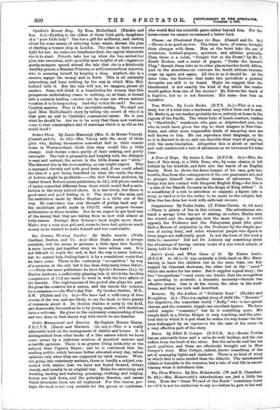Cynthia's Bonnet Shop. By Rosa Mulholland. (Blac.kie and Son. 5s.)—Cynthia
is the eldest of three Irish girls, daughters of a "poor Irish lady." She has a gift for millinery, and, casting about for some means of relieving home wants, devises the plan of starting a bonnet shop in London. The stars in their courses fight for her. An unknown benefactor finds the capital wherewith she is to start. Friends take her up when she has carried her plan into execution, and—possibly most helpful of all—ingenious gossip.mongers spread abroad the tale that she is a fabulously wealthy person, a Russian Princess, or millionairess from America, who is amusing herself by keeping a shop. Anyhow, she is a success, repays the money and so forth. This is all naturally interesting, and loses nothing by the way in which Miss Mul- holland tells it. But the tale will not, we imagine, please all readers. Some will think it a humiliation for woman that this prosperous undertaking comes to nothing, or, at least, is turned into a common trading concern run by some one whose natural
vocation it is to keep a shop. And why is this the end ? Because Cynthia marries. This is the inevitable ending. We shall not spoil Miss Mulholland's story by telling the secret of who it is that puts an end to Cynthia's commercial career. He is just what he should be. Are we to be sorry that these new ventures come to that commonplace end of marriage which is as old as the world itself ?






















































 Previous page
Previous page